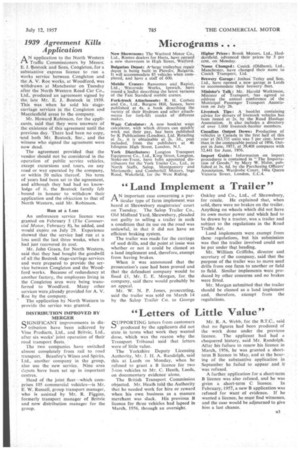"Land Implem ent a Trailer"
Page 37

If you've noticed an error in this article please click here to report it so we can fix it.
AN important case concerning a particular type of farm implement was heard at Shrewsbury magistrates' court on Tuesday. The Salop Trailer Co., Old Midland Yard, Shrewsbury, pleaded not guilty to selling a trailer in such a condition that its use on the road was unlawful, in that it did not have an efficient braking system.
The trailer was made for the carriage of seed drills, and the point at issue was whether or not it could be classed as a land implement and, therefore, exempt from having brakes.
When it was announced that the prosecution's case had been proved and that the defendant company would be fined SI, Mr. E. E. Morgan, for the company, said there would probably be an appeal.
Mr. W. N. P. Miles, prosecuting, said the trailer was sold on March 14 by the Salop Trailer Co. to George
Oakley and Co., Ltd., of Shrewsbury, for resale. He explained that, when sold, there were no brakes on the trailer. Anything on wheels which did not have its own motor power and which had to be drawn by a tractor, was a trailer and subject to the regulations in the Road Traffic Act.
Land implements were exempt from these regulations, but his submission was that the trailer involved could not be put under that heading.
Mr. William Griffiths, director and secretary of the company, said that the purpose of the trailer was to move seed drills from one farm to another or field to field. Similar implements were produced by other concerns and no brakes were fitted.
Mr. Morgan submitted that the trailer should be classed as a land implement and, therefore, exempt from the regulations.




































































































